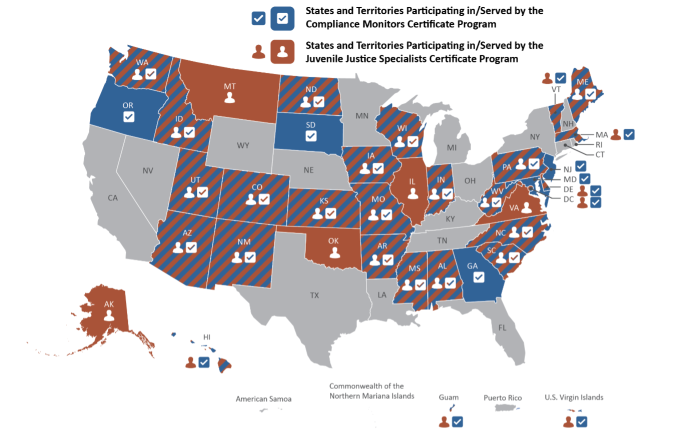Lessons Learned from a Training Program in the Juvenile Justice System
The Juvenile Justice and Delinquency Prevention Act (JJDPA) was enacted in 1974 and authorized again through the Juvenile Justice Reform Act of 2018. JJDPA provides Title II Formula grant funds to states that protect, care for, and treat youth in the juvenile justice system. JJDPA created the federal Office of Juvenile Justice and Delinquency Prevention (OJJDP) to support local and state efforts to prevent delinquency and improve the juvenile justice system. JJDPA requires states and territories to designate a state agency and form state advisory groups in states that receive Title II funds. These state agencies rely on Juvenile Justice Specialists and Compliance Monitors to make sure award recipients spend funds properly and facilities meet certain requirements of JJDPA, respectively.
OJJDP gives the title “Juvenile Justice Specialist” to the person in a state or territory who acts as their link on matters related to carrying out the JJDPA. The Juvenile Justice Specialist organizes planning efforts, makes sure people follow JJDPA and federal rules, hires staff for the state advisory group, helps oversee the use of Title II funds, and provides support in solving problems and meeting needs.
OJJDP leaders recognize that this work is important and complex. Therefore, they sought to develop a thorough and timely training opportunity for Juvenile Justice Specialists and Compliance Monitors. OJJDP partnered with the Center for Coordinated Assistance to States (CCAS) at AIR. Together, they started the first certificate programs for new Juvenile Justice Specialists and Compliance Monitors at the state level.
These certificate programs have two purposes. They introduce trainees to their roles and duties, and they create a network where peers interact with one another and experienced staff act as peer mentors. CCAS trained 53 designated state agency staff who represent 28 states, the District of Columbia, and two territories (Figure 1).
Figure 1. States and Territories That Participated in the Certificate Program

Forty-one staff members participated in the Program for Juvenile Justice Specialists, 45 participated in the Program for Compliance Monitors, and 19 participated in both programs. Participants were a mix of current Juvenile Justice Specialists or Compliance Monitors, people serving in a temporary role, and other staff from designated state agencies who wanted to learn more about the role of the Juvenile Justice Specialists and Compliance Monitors and how they could support them.
Compliance Monitors develop and implement a system for monitoring the core requirements of JJDPA in their state or territory. To be eligible for Title II Formula Grant Funding, this system must be “effective” in a process by which the state identifies, classifies, inspects, and collects data from facilities that could qualify as adult jails, lockups, secure detention facilities, or secure correctional facilities.
CCAS designed the certificate programs for adult learners. Participants use problem-solving strategies, have ongoing opportunities to apply new information, and share experiences and feedback. The training session featured 15 modules presented in 2-hour sessions through Zoom. CCAS offered the modules every 2 or 3 weeks over 7 months. A team of training and technical assistance experts worked with the OJJDP State Relations and Assistance Division team to carefully design each module. Each module covered a specific topic and included the most-up-to-date content. Certificate program participants had access to online resources and tools to help them successfully manage their state’s Title II program.
During each module, breakout sessions allowed participants to share their experiences, ask questions, and learn from their peers in small groups. In between each module, participants received resources and worked on assignments that helped apply the content they learned. The trainers also matched participants with experienced colleagues who served as peer mentors. The peer mentors gave participants more guidance as they worked through their assignments and identified goals. For example, some Juvenile Justice Specialists worked on their 3-year plans.
After each module and at the end of the training session, CCAS asked participants how satisfied they were and how well CCAS met the training goals. Participants said they were very satisfied. They also said the resources would be helpful in their work, the program increased their knowledge, and they learned from others in the program.
I’m still learning about my current position as there are so many things to learn, know, and understand about CM. I really appreciated the opportunity to attend the compliance monitoring program. — Compliance Monitor
It’s working. I have been able to work with my peer mentor to provide SAG [State Advisory Group] Board 101 training. The SAG board members are engaged and working towards the creation of the Three-Year Plan and R.E.D. Plan. — Juvenile Justice Specialist
Lessons Learned in the Certificate Program
The flexible programming addressed the changing needs of the client. The CCAS team worked with OJJDP and peer mentors to develop complete modules. Then they presented the modules in a 2 hour Zoom session.
The CCAS team was super knowledgeable about the JJRA [Juvenile Justice Reform Act] and the work we do in the juvenile justice arena. I loved how they made us feel seen and heard.
— Juvenile Justice Specialist
The social learning environment proved to be the strongest part of the certificate program for state staff, who typically work in isolation. Structured activities allowed participants to interact directly with OJJDP staff, CCAS staff, peers from other states, and experienced state staff who served as mentors. Participants said the interactions with their peer mentors were valuable for achieving goals.
The peer mentor sessions are my favorite part of this whole experience so far. Having a small group of folks to bounce ideas/questions off of has been incredibly valuable. And building a relationship with a peer mentor who has considerable experience is something I’ve been wanting since I became a CM [Compliance Monitor]/JJ [Juvenile Justice] Specialist.
The assignments between each training session allowed participants to have more learning opportunities.
One of the ‘homework’ assignments we did was really beneficial to helping me understand some of my state’s functions. It was the assignment where we did field interviews. I ended up spending time talking with our state juvenile justice representative and understanding her role and what she does. I also interviewed a person who does guardian ad litem work with the juvenile court here, and now I know what role they play in our system.
— Compliance Monitor
Feedback gathered from participants and peer mentors allowed the CCAS team to adjust the training content and format. This helped them make the training more effective and helped them record participant outcomes. CCAS used Kirkpatrick’s model, which examines how effective training is at four levels: reaction, learning, behavior, and results. The focus on continual improvement helped create a successful training program that responded to the needs of OJJDP, Juvenile Justice Specialists, and Compliance Monitors.
Next Steps
The CCAS team is applying the lessons learned from this training session as they design the next certificate programs. Through the partnership between CCAS and OJJDP, the third of four certificate programs will launch in 2022. It will be offered to Racial and Ethnic Disparities Coordinators at the state level. In addition, CCAS will update the Juvenile Justice Specialist Certificate Program and make it available to new staff. The updated program will use a mix of pre-recorded modules and live, interactive discussions with peer mentors.
